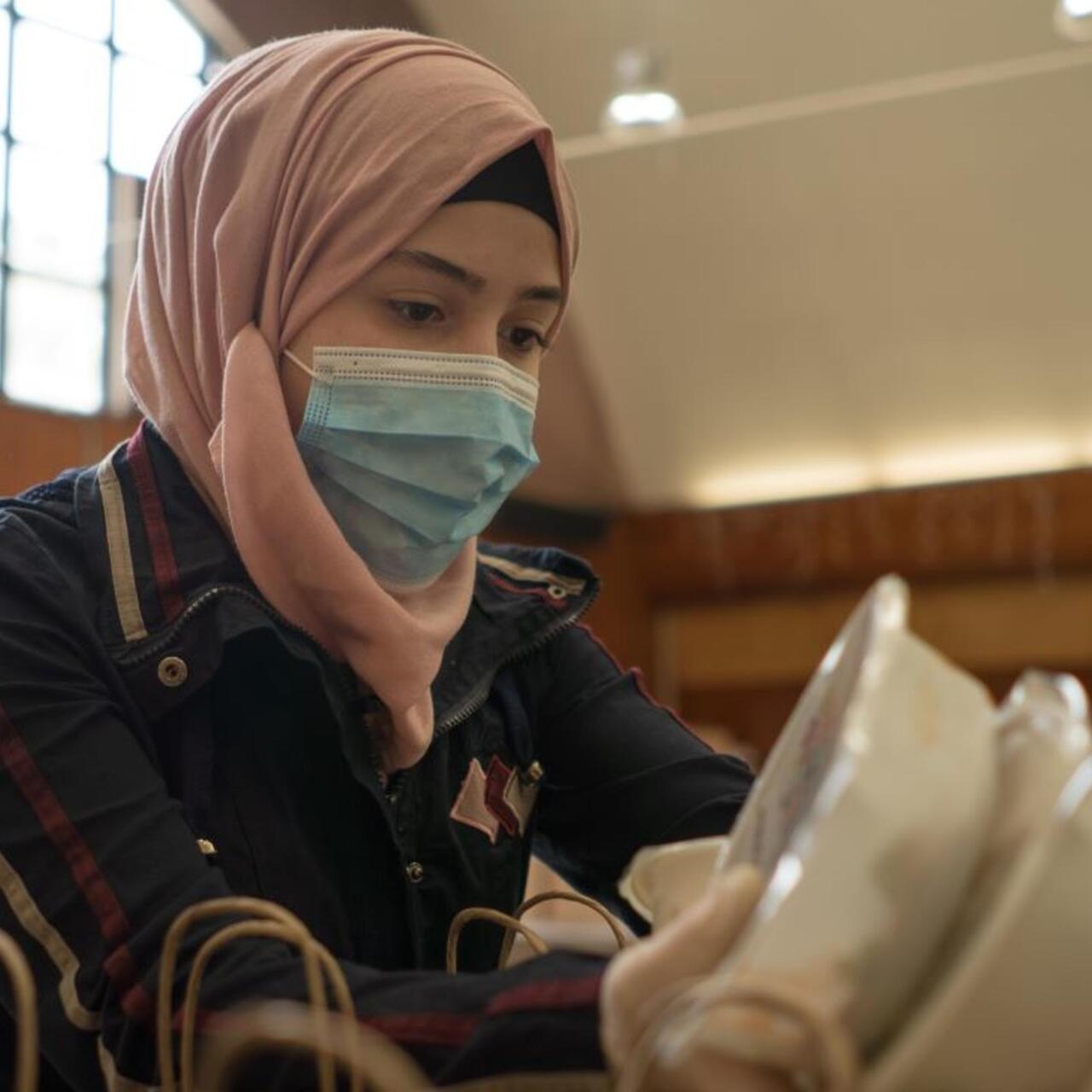
Meet the refugees helping their neighbours through the pandemic
When all you’ve had to keep going is enduring hope, you help people discover their own.

When all you’ve had to keep going is enduring hope, you help people discover their own.
As coronavirus lockdowns have taken hold around the world, “looking out for your neighbours” has deepened in significance. Refugees who fled conflict and persecution are committed to caring for people in their new communities during the pandemic. From delivering food packages to sharing vital information about COVID-19, they’ve gone out of their way to ensure others don’t feel alone. Because when all you’ve had to keep going is enduring hope, you help people discover their own.
Meet the refugees helping their neighbours through the pandemic.
Refugee. Youth Advocate. Community Leader.

Twenty-three-year-old Jean Marie Ishimwe is well acquainted with the struggles of refugees in Nairobi, Kenya. A refugee himself from Rwanda, he co-founded a group to teach digital skills to refugee youth and co-chairs a youth empowerment organization. Today, he is using his coordination and motivational skills to mobilise young people to respond to the COVID-19 pandemic.
“My greatest strength is the youth that I interact with,” he says. “They give me strength to continue.”
Knowing that both refugees and locals would struggle during the pandemic, Jean Marie organised youth to raise money and put together food packages to sustain a family for two to three days. The group adds masks to the packages and spends time educating recipients about COVID-19.
“I am not infected, but I am affected,” Jean Marie says, pointing out that the pandemic has touched all aspects of life and requires action from all of us.
“We have to try to commit ourselves to helping our communities in any way possible. There’s nothing small during the coronavirus. Everything is important. Everything that is positive is important.”
Refugee. Food Distributor. Front-line Worker.

Twenty-year-old Rania Abou is from Damascus, Syria. She came to U.S. as a refugee, with her father and brothers, less than a year ago. (Rania's mother passed away several years earlier while the family was living in Egypt.) Today, she works as a food distributor with the International Rescue Committee and World Central Kitchen in New Jersey, United States.
An artist, Rania dreams of putting her drawing skills to work as an engineer. When the coronavirus put those plans on hold, she jumped at the chance to help her community.
“When people who need the food come, we give the food to all without asking them their name or ID or anything like that. We just ask them how many people in their family and give them the food.
“When I see the kids smiling, I feel happy. And that's given me hope.
“I want to say that we should all stay at home and stay hopeful. And if we can help others, we should help others … if I can help, I should help. In the future, somebody will help me. It's like a circle. I will somebody and somebody helps me.”
“I think if my mum [was] alive, she [would] be proud of me.”
Refugee. Community Volunteer. Refugee Advocate.

Twenty-one-year-old Yasmin is a Rohingya refugee from Myanmar living in Cox’s Bazar in Bangladesh, the world’s largest refugee camp. In May, the first case of the coronavirus was reported in the camp.
As a community volunteer for the IRC, Yasmin’s been going door-to-door to raise awareness about protection from the virus.
"The camp is a very crowded place and there isn’t enough soap,” she explains. “There’s no electricity, so we can’t take baths properly. We’re in a very risky situation, living like chickens in a cage. It’s very tense—but we have to control our fear … we have to be brave.
"People are living in fear. We teach them how to stay safe from the coronavirus: that people must wash their hands, avoid crowded places and go to the hospital if they get sick."
The challenges are great, but Yasmin remains hopeful. "Rohingya people help others as much as possible. They take care of each other, they stay together."
Refugee. Community Champion. Friend.

When the lockdown started in Germany, ninety-one-year-old Irmgard became a source of knowledge and comfort for her younger friends. A voluntary Grandma to Berliners, Irmgard shared tips from her post-war years.
"I was surprised how many people called me to talk," she says, explaining that she offered advice to people on things like batch-cooking to reduce the number of times they had to go to the supermarket.
Irmgard, born in Silesia, now Poland, was forced to flee her home in 1945 in fear of the Russian Soviet ‘Red Army’. She left all her belongings behind and relocated to East Germany, where she was welcomed by a kind farmer’s family. But the call of a better life out of communist rule led her to leave her home again in 1957. “When the Berlin Wall was built in 1961 and many fled West Berlin, I moved in,” Irmgard says.
Today, she is a proud Berliner and spends her days giving back. Whether it’s helping residents in her supported housing get around in their wheelchairs, cooking up her infamous lasagnes, or being on the end of the phone to support someone feeling isolated during the pandemic, Irmgard is always putting others before herself. “What really worries me is my younger friends getting sick. They have their whole lives ahead of them. Every day I hope they stay healthy!"